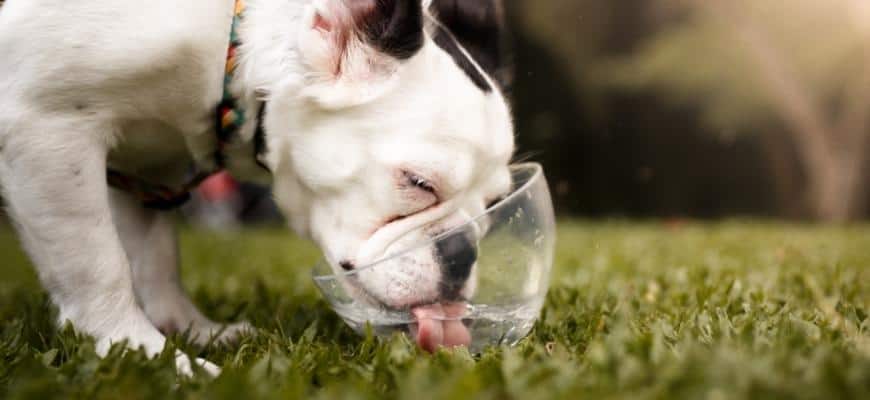[ad_1]
Toilet training a puppy can be hard work, especially during the early months of your new canine companion’s life.
But how much water should a puppy drink during potty training? Can puppies go without it overnight? And should you limit your pup’s water while potty training?
Read this guide to learn how much water your puppy should consume while potty training.
How Much Water Does A Puppy Need?
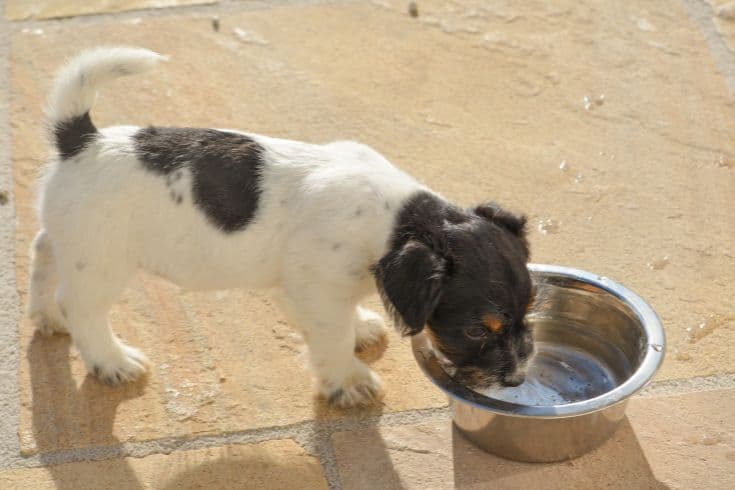

Before we discuss how much water a puppy should drink during potty training, we must talk about the importance of hydration in general.
All mammals must remain properly hydrated throughout the day. A dog’s body is almost 70-80% water, so if the body is deprived of the water it needs, the animal’s vital processes will cease to function efficiently.
So, your puppy’s digestion, brain activity, respiration, and circulation will all be negatively impacted without water. When water enters your puppy’s body, the liquid flows through the bloodstream, removing toxins and other harmful products as it does so. It also carries oxygen around the body.
If your dog doesn’t receive enough water, toxins will accumulate, potentially harming some of your pet’s vital organs.
Overheating
Puppies and adult dogs are at risk of overheating in hot weather. Water helps your puppy to regulate his body temperature. Since dogs can’t sweat other than through their pads, panting is their primary way of keeping cool. As the dog pants, he loses a lot of water through his tongue. That means the dog will need to drink more water to remain hydrated than he usually does.
So, proportionately, puppies need to drink as much water every day as adult dogs.
What Happens When A Puppy Is Dehydrated?
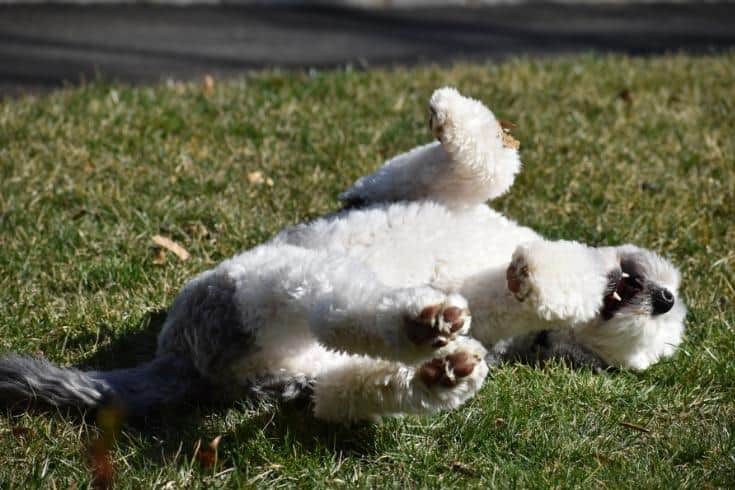

Canine dehydration happens when a puppy or dog doesn’t drink sufficient water.
Dogs of all ages are generally pretty efficient at self-regulating the volume of water they drink each day, even if they have constant access. Dogs typically only drink when they feel thirsty, and even then, they only drink exactly what they need.
Causes Of Dehydration
There are some occasions when a puppy can become dehydrated.
For example, if a puppy is suffering from a fever, vomiting, or diarrhea, he will drink more than usual to replace the water he’s lost. Dogs with medical conditions that cause them to urinate excessively will often drink more in an effort to keep their bodies adequately hydrated.
In addition, dogs that are fed a diet exclusively of dry food can become dehydrated if they are not given access to enough water since kibble only contains around 10% moisture.
Sometimes, a puppy might dislike his water bowl. Perhaps a metal bowl makes the water taste unpleasant, for example. In that case, watch your puppy’s behavior around his water bowl and replace the bowl if necessary.
How To Tell If Your Puppy Is Dehydrated
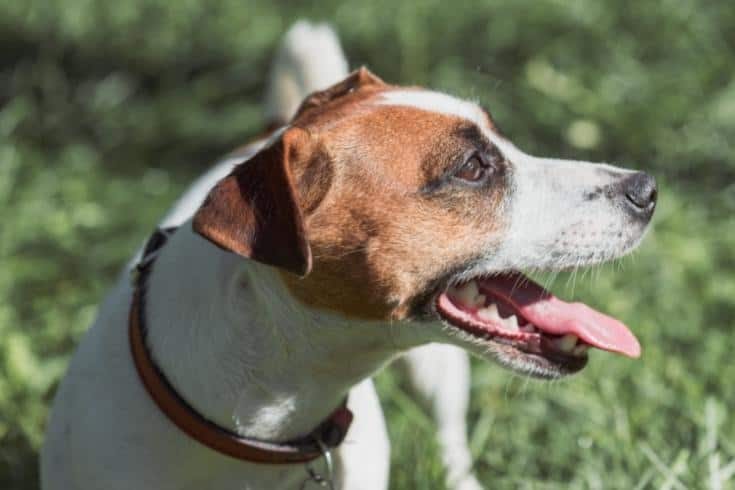

So, how can you tell if your puppy is dehydrated?
Well, there are a few telltale signs to look out for that are indicators of dehydration in dogs.
- If your puppy’s gums are dry or stick to your hand, your puppy is dehydrated and needs more water.
- Gently hold your puppy’s scruff on the back of his neck. Stretch the skin a little and release it. If the skin immediately returns to its proper place, the puppy is well-hydrated. If the skin takes a few seconds or longer to come back to normal, your furry friend could be dehydrated.
- Press a finger across your pup’s gums to momentarily stop the blood flow. The area you press should turn white. Now, release the gum and watch for the pinkish color to return. If the gum colors up quickly, your pup is well-hydrated. However, if the gum stays white for more than a few seconds, you need to give your puppy more water right away.
More subtle signs that your puppy is dehydrated include:
- Loss of energy and general lethargy
- Panting
- Dry-looking, sunken eyes
- Dry nose
- Thick saliva
Remember that your puppy should have access to clean water throughout the day.
However, some puppies can be reluctant to drink, especially when newly weaned. In that case, you’ll need to give your furbaby some encouragement to prevent him from becoming dehydrated.
How To Encourage Your Puppy To Drink
If your puppy is dehydrated or you’re concerned that he’s not drinking enough, what can you do?
First of all, you need to show the puppy that the water dish is his. Put the bowl close to your pet’s bed. Of course, if your puppy is undergoing crate training, you must provide him with a special crate water bowl or a water bottle that won’t leak and flood the crate.
A stale, dirty bowl of water won’t encourage the pup to drink. So, you must always keep the water bowl full of clean water.
If your puppy is reluctant to drink, you could try rewarding him with a treat whenever he drinks until he gets used to the bowl. Sometimes, adding broth to the water can make it smell and taste more appealing for your puppy.
Another novel way of hydrating your puppy is to give him frozen water cubelets to chew on. That’s a fun game for your puppy and is also an excellent way of hydrating him.
What Is Canine Overhydration?
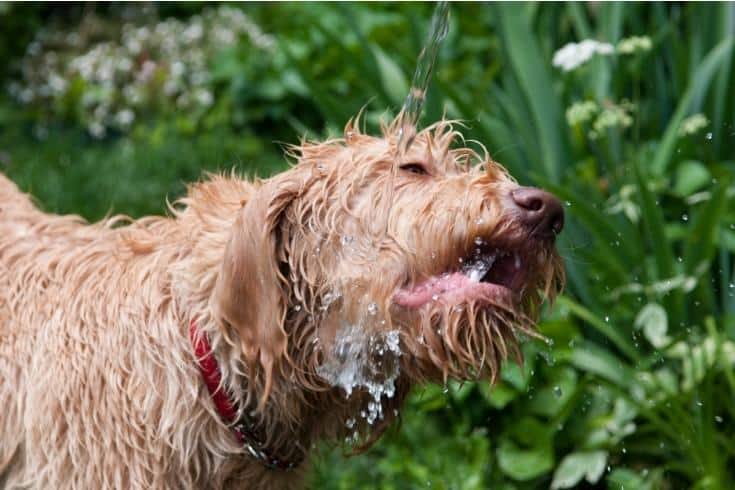

Although you don’t want your puppy to become dehydrated, overhydration can also be a problem in dogs. Basically, overhydration means that your dog is drinking too much water, and that can be just as dangerous for your puppy as not drinking enough.
The risk of water intoxication most commonly occurs during hot weather when dogs can be tempted to drink too much, especially after exercise. Sometimes, a change in food can also cause a dog to drink more water.
However, overhydration can sometimes be the body’s response to metabolic changes, including health conditions such as Cushing’s disease, diabetes, kidney failure, or pyometra.
For that reason, we always recommend that you contact your vet for advice if you’re concerned that your dog is showing any of the symptoms of water intoxication described below.
What Are The Symptoms Of Canine Overhydration?
Dogs that drink too much water tend to show very specific symptoms that are pretty easy to spot, including:
- Excessive salivation
- Bloating
- Vomiting
- White, very pale gums
If you notice your furry friend constantly guzzling down water and displaying any of those symptoms, contact your vet immediately.
How To Deal With Overhydration
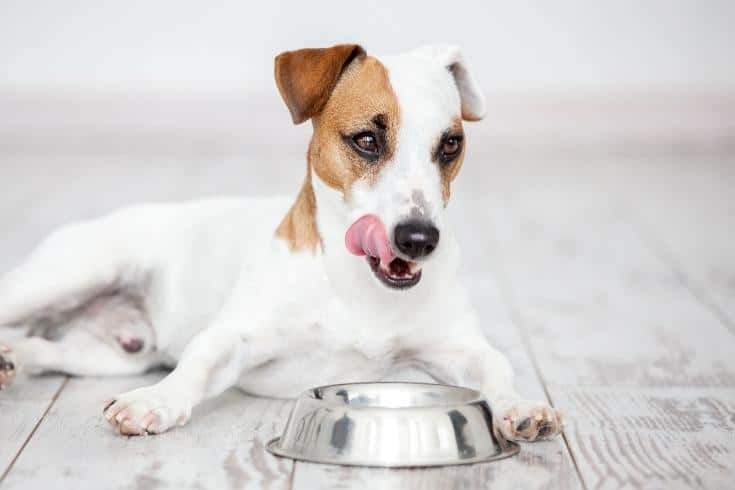

If your puppy is drinking more than eight ounces of water per day, his water intake is too high, and your pet could be overhydrated.
Your first port of call for advice should be your vet. If the vet decides that your dog isn’t over-drinking due to illness or some other physical condition, there are a few things you can do to reduce your puppy’s water intake:
- Substitute your dog’s water bowl for a water bottle to slow down his rate of water consumption.
- Ration your pup’s water by leaving the bowl half-full so that he can’t wolf the whole lot. Refill the bowl a few times a day.
- Add a few ice cubes to the water bowl. That slows down the puppy’s drinking rate, and the cold sensation can help to cool him down during hot weather and after intense physical activity.
Do not remove your dog’s access to water altogether! Even if your dog appears to be drinking too much water, he could still be vulnerable to dehydration if you take away the water altogether.
How Much Water Should A Puppy Drink During Potty Training
So, how much water should a puppy drink during potty training?
Puppies need different amounts of water based on their age and size.
Pre-weaned Puppies
Pre-weaned puppies depend solely on their mother’s milk or milk supplement in the case of orphans. So, pre-weaned puppies don’t need water since they derive all their hydration requirements from their mother’s milk.
In any case, litters of puppies are not potty trained until they are weaned.
During Weaning
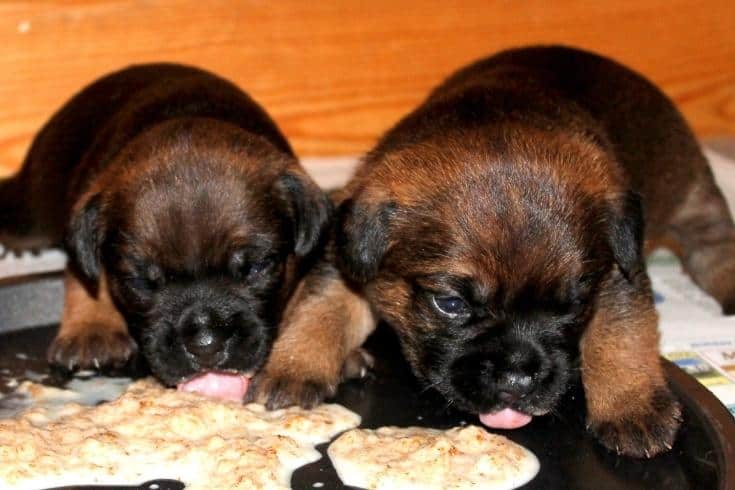

Puppies are generally weaned at three to four weeks old, and the weaning process lasts for around four weeks.
During the weaning process, puppies need around half a cup of water every couple of hours. That water, together with milk and moistened food, provides all the water the puppy needs during the weaning process.
After Weaning
Once weaning is complete, you can begin potty training your puppy. During that time, puppies should drink half an ounce to one ounce of fresh water per pound in body weight each day. So, if you have a puppy weighing 6 pounds, he should drink around 3 to 6 ounces of water every day.
Should I Limit My Puppy’s Water While Potty Training?
Puppies need to consume lots of water while growing, making them somewhat more susceptible to dehydration than full-grown adult dogs. Generally, your puppy should have access to clean water 24/7/365.
However, that changes while you’re potty training your pet when a bit of water restriction is necessary to prevent accidents when you’re not around to supervise your puppy.
Can Puppies Go Without Water Overnight?
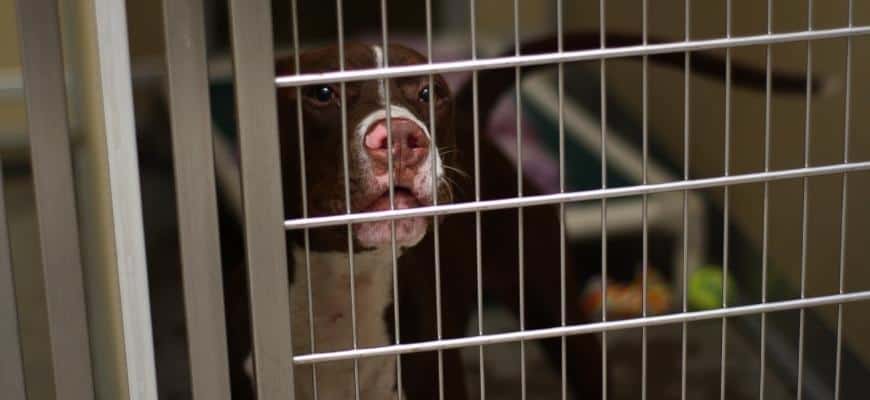

When it’s time for your puppy to settle down for the night, you should remove your pet’s water roughly two to three hours before bedtime.
Don’t reduce your puppy’s water during the day, as that can cause dehydration.
Final Thoughts
Did you enjoy our guide on how much water a puppy should drink during potty training? If you found the information helpful, please take a moment to share the article before you go.
Ideally, you should remove water from your puppy two to three hours before you settle him down at bedtime. Throughout the day, your puppy should have unrestricted access to water. A lack of water can cause dehydration, potentially leading to serious health problems. However, excessive water consumption might cause problems too.
How’s your puppy potty training going? Tell us how you did in the comments box below.
[ad_2]
Source link
